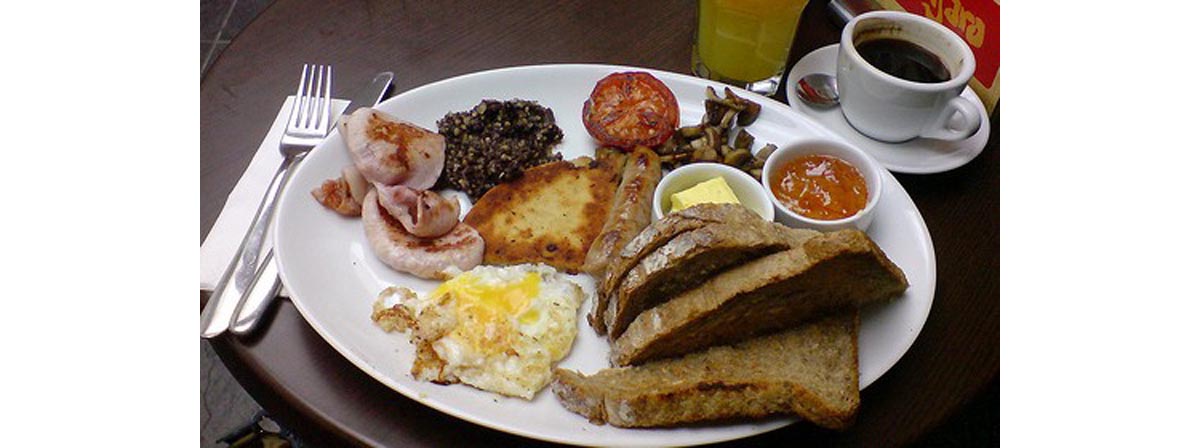"Skipping Breakfast Tied to Heart Attack, Coronary Artery Disease Risks," headlines blazed on all the news services. The prestigious medical journal Circulation published a "landmark" study finding that male health care professionals who didn't eat breakfast were more likely to develop heart disease and more likely to die of it. But before you head out to the supermarket to stock up on heart-healthy bacon and eggs, it might help to know what this study did and did not determine.

Back in 1992, researchers at the Harvard School of Public Health sent out a questionnaire to 26,902 American men employed in the health professions and then aged between 46 and 82. The men were asked about many aspects of their eating habits, including whether they ate breakfast, and whether they ate at night, for instance, as well as whether they ate midnight snacks. Then for the next 16 years the Harvard School of Public Health accumulated data on the health outcomes of the men who completed the survey. During those 16 years, first-time cardiovascular events (including death) occurred in a total 1,572 of the men.
When the data finally came out in 2013, researchers concluded that men who skipped breakfast had a 27 percent higher risk of developing coronary artery or heart disease than men who ate breakfast nearly every day. The study also found, although this was not reported in the news media, that men who ate late at night had a 55 percent higher risk of developing heart disease than men who quit eating after dinner.
The explanations of the data by the Harvard research team, however, leave a great deal to be desired. From the newsroom of the medical journal, one of the researchers explained:
- Skipping breakfast seems to lead to weight gain (because of the calories not eaten and made up for later in the day by eating junk foods), higher cholesterol (from the foods not consumed), and diabetes (caused by not eating sugar).
- Proportionally, eating late at night increased the risk of heart disease twice as much as skipping breakfast, but this data could be ignored because more men in the study skipped breakfast than ate at night.
- The risk of heart disease was also increased by obesity, smoking, high cholesterol, diabetes, failure to maintain healthy blood pressure, poor sleeping habits, stress, whether men were married, how much TV the men watched, and whether or not they lost their jobs, but since we already knew that, we can ignore these facts and just tell men to eat oatmeal, the food that men who don't eat breakfast don't eat for heart health.
Of course, the heart health researchers didn't consider the possibility that a deficiency of bacon and eggs might really be what was driving the increased risk of heart disease. On the surface, this study seems silly. On closer inspection, this study still seems silly. But that doesn't mean there is no relationship between eating breakfast, or skipping breakfast, and heart health.
Reasons Skipping Breakfast Might Actually Be Heart-Healthy
The Canadian fitness researcher Brad Pilon suggests that there are a number of reasons that skipping the morning meal might actually enhance metabolic health. Pilon points out that no one really skips "breakfast," since the meal is by definition the food one eats to end a fast, a break-fast, no matter when it is eaten. And going without food, also called intermittent fasting — as the even greater increase in cardiovascular disease in men who ate late at night suggests — might actually be the key to heart health.

Skipping Breakfast Lowers Leptin levels
Eating any kind of breakfast provides extra calories that can be stored in the form of fat. When fat cells are full, they release a hormone called leptin. This hormone tells the brain "OK, we're full, so you can go about your regular activities now," including the stimulation of inflammation. Before fat cells fill up, they don't release significant amounts of leptin.
Lower levels of leptin in the bloodstream result in lower levels of inflammation throughout the body, including the linings of blood vessels. Eat less, and the body releases less inflammation. Eat more, and the body releases more inflammation. Perhaps the problem wasn't skipping breakfast, it was actually eating late at night, before going to sleep (and then eating breakfast, too).
Skipping Meals Allows Fat to Be Burned Instead of Stored
Pilon also points out that fasting, which is going without any food for any period of time longer than is currently considered normative, also changes the way in which fat cells respond to insulin. The insulin hormone activates a protein called hormone-sensitive lipase, which is also known as HSL. This hormone locks fatty acids inside fat cells in a form that can't slip out through molecule-sized portals to the bloodstream. Fat stays inside fat cells and can't be burned for energy as long as insulin levels are high.
Eating just 8 grams (about 1/4 of an ounce, the equivalent of 30 calories) of food causes the pancreas to release insulin so that the consumed fat stays locked in place. The only way ever to get rid of fat is to lower insulin levels so your fat cells are less sensitive to HSL, and that only happens when you go at least a little while without eating — optimally at least 18 hours.
And the easiest way to fast for 18 hours is to avoid late-night snacks, and in fact to stop eating at all after dinner, and to then also skip breakfast. It makes a lot more sense to rely on not-eating as a way to avoid gaining weight and raising cholesterol, along with increasing inflammation, than to suppose that eating a "healthy breakfast" somehow has a magical, heart-healthy effect.
That is not to say that a healthy breakfast is bad for you, as such — not at all. We do need to give our bodies the time to go through their natural cycles in order to stay healthy, however, and piling the calories on will always lead to weight gain.
- Cahill LE, Chiuve SE, Mekary RA, Jensen MK, Flint AJ, Hu FB, Rimm EB. Prospective Study of Breakfast Eating and Incident Coronary Heart Disease in a Cohort of Male US Health Professionals. Circulation. 2013 Jul 23. 128(4):337-43. doi: 10.1161/CIRCULATIONAHA.113.001474. PMID: 23877060.
- Chiuve SE, McCullough ML, Sacks FM, Rimm EB. Healthy lifestyle factors in the primary prevention of coronary heart disease among men: benefits among users and nonusers of lipid-lowering and antihypertensive medications. Circulation. 2006 Jul 11. 114(2):160-7. Epub 2006 Jul 3.
- Photo courtesy of Mark by Flickr : www.flickr.com/photos/mhl20/3449326505/
- Photo courtesy of Robert Wallace by Flickr : www.flickr.com/photos/robwallace/2746681668/


Your thoughts on this